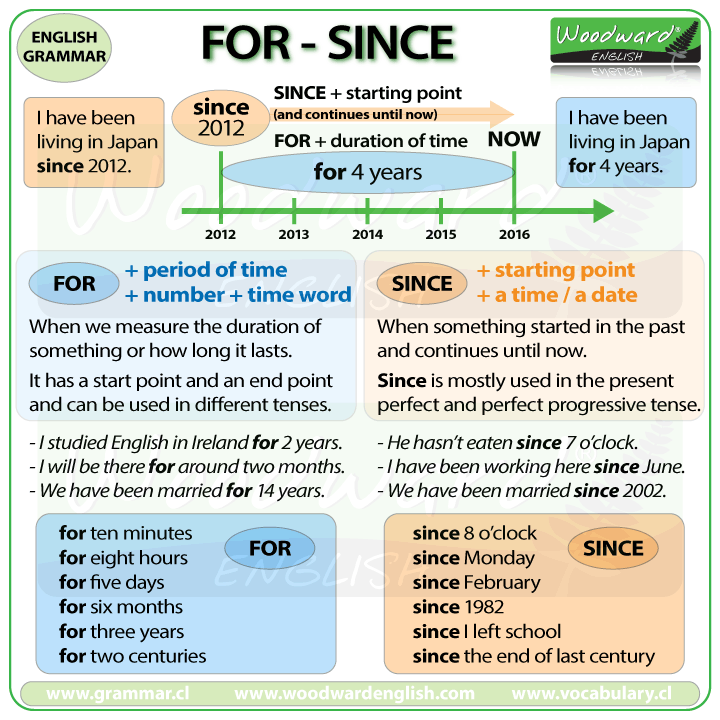For - Since
English Grammar Rules
The use of FOR
We use For when we measure the duration – when we say how long something lasts.
For + a period of time
To measure a period of time up to the present, we use the present perfect tense and not the present tense.
- I have known her for a long time. (Correct)
I know her for a long time. (Incorrect) - I have lived here for ten years. (Correct)
I live here for ten years. (Incorrect)
The present tense with For refers to a period of time that extends into the future.
- How long are you here for? (Until when)
- How long have you been here for? (Since when)
In reality, we can use all verb tenses with For.
| Uses of For | |
|---|---|
| Example sentence | Verb Tense |
| They exercise for two hours every day. | Present tense |
| They are exercising for three hours today. | Present continuous |
| He has lived in Moscow for a long time. | Present perfect |
| He has been living in Turin for three months. | Present perfect continuous |
| I worked at the service station for five years. | Past tense |
| He will be in hospital for at least a week. | Future tense |
However, we don't use For with expressions such as all day or all the time.
- I was there all day. (Correct)
- I was there for all day. (Incorrect)
The use of SINCE
Since gives the starting point of actions, events or states. It refers to when things began.
Since + a point in time (in the past), until now.
- I've been waiting since 7 o'clock.
- I have known him since January.
With since we use the present perfect tense or the past perfect tense.
- I have been here since 5 o'clock and I am getting tired.
- I had been working since 5 o'clock and I was getting tired.
Since can also be used in the structure It has been + period of time + since.
- It has been two months since I last saw her.
- It has been three years since the last earthquake.
For vs. Since
Knowing when to use FOR and when to use SINCE is important. Therefore it is useful to look at a summary of the contrast between FOR and SINCE.
| FOR to mention a specific period (or duration) of time. | SINCE to mention the starting point of a period of time (continues to now). |
|---|---|
| I have been a doctor for fifteen years. (duration = 15 years) | I have been a doctor since 1992. (starting point = 1992) |
| She has been a mother for six months. | She has been pregnant since her first child was born. |
| My sister has lived in Frankfurt for nine months. | My sister has lived in Frankfurt since the beginning of March. |
Both For and Since are most commonly used with the perfect tense - we don't use these expressions in the present tense.
| Correct | Incorrect |
| I have learnt Russian for three years. | I learn Russian for three years. |
| They have taught geography since last year. | They teach geography since last year. |
| He has owned his dog since his cat died. | He owns his dog since his cat dies. |
While we can use For in the simple past tense we can't use Since in the simple past tense. Since can only be used in the perfect tense.
| Correct | Incorrect |
| She went to Japan for three years. | She went to Japan since 2003. |
| I studied in New Zealand for one month. | I studied in New Zealand since one month. |
| He walked his dog for four hours. | He walked his cat since four hours. |
It should be remembered that both For and Since have other meanings in English that are not associated with time.
- This is for you.
- Is this the train for London?
- Since you asked, I'll say yes.
- Since he didn't study he didn't pass the exam.
Summary Chart

FOR vs. SINCE Quiz
Can YOU get 20/20 correct?
Next activities
Would you like to play a game to practice the difference between For and Since? Then try this Game.
See our For vs. Since English Lesson as a part of our free course.
If you found this grammar lesson about the difference between For and Since in English useful, let others know about it.
